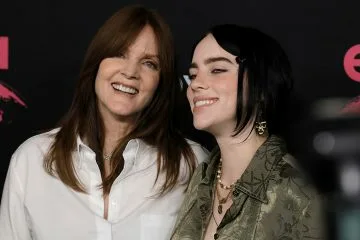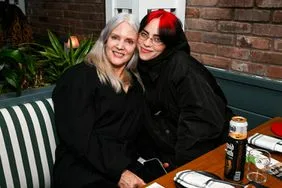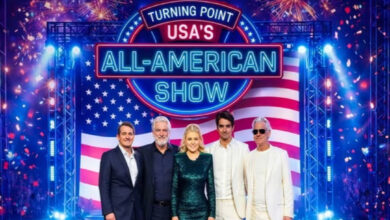doem The Mom Who’s Quietly Saving the Music Industry (and Maybe the Planet)
She’s not just Billie Eilish’s mom — she might be the woman saving the planet, one concert at a time. While the music industry obsesses over streams, stadiums, and sold-out tours, Maggie Baird is focused on something far bigger: making sure there’s still a world left for the next generation to sing in.
The Green Revolution Nobody Saw Coming
At first glance, Baird doesn’t fit the mold of a revolutionary. She’s soft-spoken, thoughtful, more likely to be found behind the scenes than under a spotlight. But while most artists were chasing viral hits, she was quietly rewriting what a “world tour” means — transforming it from a carbon nightmare into a blueprint for sustainability.
When Billie Eilish’s Happier Than Ever world tour launched, few noticed the details: solar-powered stages, vegan catering, zero-diesel tour buses. But by the time her 2023 Lollapalooza set ran entirely on solar-charged batteries, the industry had to take notice. The “Bad Guy” generation was going green — and it wasn’t a marketing stunt.
A Crazy Idea That Worked
It all started with a question no one wanted to ask: What’s the real cost of a concert?
For years, festivals have been environmental disasters — diesel fumes, plastic waste, thousands of flights. Yet when Baird launched her non-profit Support + Feed, she didn’t just want to talk about change; she wanted to prove it was possible.
She began feeding families plant-based meals during the pandemic, then expanded her mission to live music. The idea sounded absurd: replace meat-heavy catering with vegan menus, build merch from recycled fibers, and power stages with clean energy. But one by one, barriers began to fall.
Now, what once sounded like a “crazy eco idea” has turned into the new industry standard. Tours by Coldplay, Harry Styles, and The 1975 are experimenting with similar systems. Even major festivals are rethinking their energy grids after seeing Eilish pull it off without a single generator.

“Business as Usual” Is Dying
The live music business has long thrived on excess — private jets, plastic bottles, and “bigger is better” production. But Baird’s movement has exposed an uncomfortable truth: fans care. A 2024 REVERB survey found that over 80% of concertgoers say they want artists to reduce their environmental impact.
Suddenly, “green” isn’t a buzzword — it’s good business.
Eco-friendly merch? The price gap is shrinking fast. Plant-based catering? Cheaper than meat and better for health. Even the tech behind clean energy is advancing rapidly. What seemed like an idealistic experiment is now a logistical model — one that can save money and reduce emissions at the same time.
“We don’t have to choose between great music and a healthy planet,” Baird told Billboard’s Live Music Summit earlier this year. “We just have to choose to care.”
The Moral Dilemma Behind the Music
Still, there’s a question no one wants to face: can music really stay green when money talks louder than morals?
Sustainability sounds beautiful until profit margins shrink. Some labels quietly push back, claiming eco-touring is too expensive or complicated. Others see it as a branding opportunity rather than a mission. For every solar-powered stage, there’s still a private jet burning fuel in the sky.
But fans are watching. And they’re demanding accountability. Artists who once ignored climate issues now face backlash for hypocrisy — talking about “saving the world” from a 10-car motorcade. The culture of silence is breaking, and Maggie Baird’s influence is impossible to ignore.

The Power of One Mom
Baird’s story is part of something bigger than celebrity activism. It’s a reminder that revolutions don’t always start in boardrooms — sometimes they start in kitchens. When Billie was just a teenager writing songs in her bedroom, her mom was already building a foundation of mindfulness, empathy, and responsibility.
Now, that same mindset is shaping how pop’s biggest names think about their place in the world. The irony is almost poetic: while millions scream for Billie Eilish under neon lights, her mother is making sure those lights don’t poison the air.
The Future of Music Is Green — or It Isn’t
As more artists join the movement, one thing becomes clear: sustainability is no longer a fringe idea; it’s the future of live entertainment. The only question is whether the industry will embrace it out of conviction — or out of necessity.
Because one day soon, “eco-friendly” won’t be optional. Rising energy costs, environmental regulations, and fan expectations are already pushing change faster than anyone predicted.
If Maggie Baird has her way, tomorrow’s tours won’t just sound electric — they’ll run on it.
The Last Note
Maybe this is how revolutions really start — not with a protest, but with a power switch. A mother’s belief that music shouldn’t cost the Earth has already changed one superstar’s career, and maybe, just maybe, the entire industry.
But as stages glow greener and hashtags spread, the question lingers: Is the music world truly ready to give up “business as usual”? Or will it take another generation to finish what Maggie Baird started?



